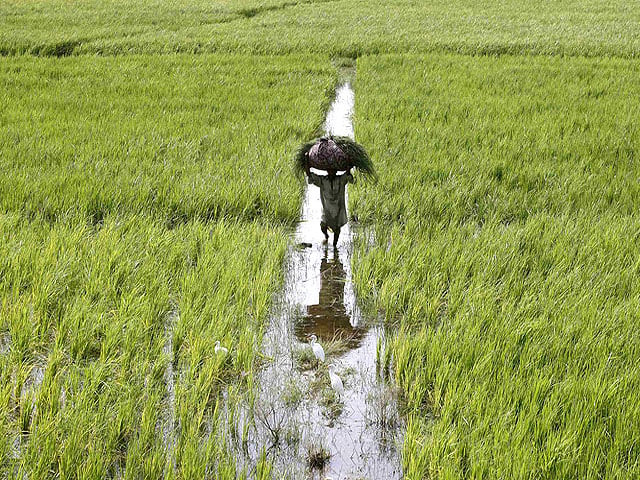Changing trends: Agri prices to rise in next five years, hurting growth in FMCG sector
KSE managing director says growth in agriculture likely to slow down after Pakistan joins IMF programme.

Agrarian economy: 23% of Pakistan’s GDP is the size of the country’s agricultural sector as of now, following the Pakistan Bureau of Statistics’ recent rebasing exercise. PHOTO: FILE/REUTERS
While the Pakistan People’s Party’s (PPP) performance on the overall economic front is highly debatable, many seem to agree that the agriculture sector is better off today compared to what it looked like five years ago. As agricultural income remains tax-free, regular increases in support prices of major crops has ensured a continuous influx of money into the rural economy, making farmers better off, by and large.
However, according to Karachi Stock Exchange (KSE) Managing Director Nadeem Naqvi, growth in the agriculture sector is likely to slow down as the country is expected to join an International Monetary Fund (IMF) programme under the next government.
“I do not see the high level of support to the agriculture sector to continue, given the very limited financial leeway available to the (next) government. Approaching the IMF will lead to a drastic reduction in power-sector subsidies, effectively increasing the input costs for farmers. Secondly, there will be real pressure to reform the tax system, which can possibly mean RGST as well as a tax on agriculture income,” he said.
Disregarding quality differentials and considering average prices, revenues of four major crops – wheat, cotton, sugarcane and rice – were approximately Rs530 billion in 2007, according to Naqvi. “The revenue figure for 2011-12 for the same crops was Rs1.5 trillion. This means that revenues of the agriculture sector increased by Rs1 trillion in five years,” he said. That translates into an annualised increase of over 23% in farmers’ income over the five years when the PPP government was in power. “In dollar terms, that is an influx of around $12-13 billion into the rural economy in just half a decade,” he added.
As per the recent rebasing exercise by the Pakistan Bureau of Statistics, the size of the agricultural sector now stands at 23% of total gross domestic product (GDP), as opposed to the earlier estimated share of 20.3%. Agriculture sector growth for fiscal 2008, 2009, 2010, 2011 and 2012 remained 1%, 4%, 0.6%, 2.4% and 3.1%, respectively. In 2012-13, the agriculture sector is estimated to have grown at the rate of 3.4%.
Fallout
The KSE MD believes growth in agricultural income over the next five years will be lower than what it has been in the last five years. He also noted that as power subsidies come down and electricity becomes expensive, retail prices of consumer goods will go up, hurting the margins of the fast-moving consumer goods (FMCG). “I foresee a slowdown in the earnings growth of the FMCG sector. As earnings slow down, their valuations can also possibly be affected. As a result, I see sector rotation in the next five years with less emphasis on the FMCG sector in contrast to the last five years,” he said.
Currently, stocks in the FMCG sector trade at nearly 34 times 2012 earnings, compared to the seven times earnings that the overall market trades at, according to BMA Capital, a brokerage house based in Karachi.
In a separate report released in January early this year, the State Bank of Pakistan said the net profits of FMCGs listed on the KSE grew by over 20% in FY12. “It is important to mention that the FMCG’s bottom-line has been growing this rapidly for the last five years, and the sector has outperformed the KSE 100-Index with a wider margin,” the SBP report said.
“I think we are going to see a shift in income generation from rural to urban in the next five years. As that happens, I think manufacturing entities, textiles, cement, oil and gas and telecoms will probably be the more attractive sectors for investors [in the future],” Naqvi said.
Published in The Express Tribune, May 5th, 2013.
Like Business on Facebook to stay informed and join in the conversation.


















COMMENTS
Comments are moderated and generally will be posted if they are on-topic and not abusive.
For more information, please see our Comments FAQ